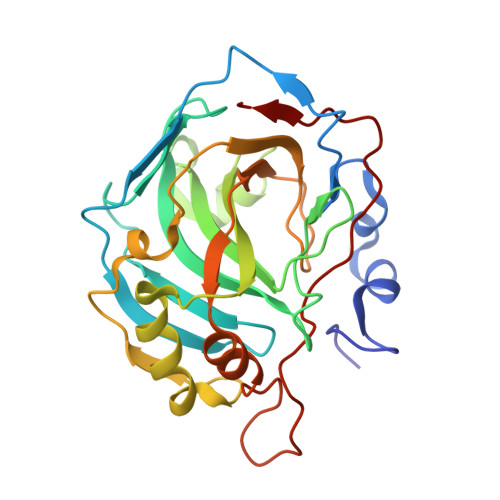Isoform-Selective Enzyme Inhibitors by Exploring Pocket Size According to the Lock-and-Key Principle.
Dudutiene, V., Zubriene, A., Kairys, V., Smirnov, A., Smirnoviene, J., Leitans, J., Kazaks, A., Tars, K., Manakova, L., Grazulis, S., Matulis, D.(2020) Biophys J 119: 1513-1524
- PubMed: 32971003
- DOI: https://doi.org/10.1016/j.bpj.2020.08.037
- Primary Citation of Related Structures:
6T4N, 6T4O, 6T4P, 6T5C, 6T5P, 6T5Q, 6T81, 6TL5, 6TL6 - PubMed Abstract:
In the design of high-affinity and enzyme isoform-selective inhibitors, we applied an approach of augmenting the substituents attached to the benzenesulfonamide scaffold in three ways, namely, substitutions at the 3,5- or 2,4,6-positions or expansion of the condensed ring system. The increased size of the substituents determined the spatial limitations of the active sites of the 12 catalytically active human carbonic anhydrase (CA) isoforms until no binding was observed because of the inability of the compounds to fit in the active site. This approach led to the discovery of high-affinity and high-selectivity compounds for the anticancer target CA IX and antiobesity target CA VB. The x-ray crystallographic structures of compounds bound to CA IX showed the positions of the bound compounds, whereas computational modeling confirmed that steric clashes prevent the binding of these compounds to other isoforms and thus avoid undesired side effects. Such an approach, based on the Lock-and-Key principle, could be used for the development of enzyme-specific drug candidate compounds.
Organizational Affiliation:
Department of Biothermodynamics and Drug Design, Vilnius University, Vilnius, Lithuania.



















